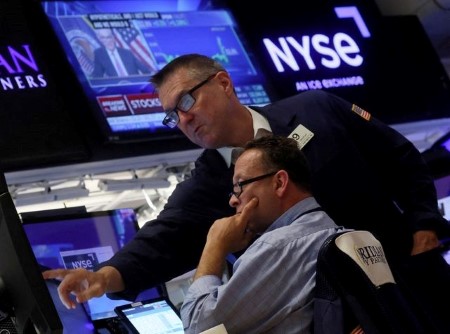




Policy Rate Updates: BSP outlook — cloudy with a chance of rate cut
 DOWNLOAD
DOWNLOAD

January Economic Update: Growth slows, prices rise
 DOWNLOAD
DOWNLOAD

Inflation Update: Up, up, and away?
 DOWNLOAD
DOWNLOAD


Wall Street extends losses on rate hike worries

Aug 29 (Reuters) – US stock indexes fell on Monday, adding to a sharp selloff last week as investors worried about the Federal Reserve’s plan to keep raising interest rates in its fight against inflation even at the cost of an economic slowdown.
Fed Chair Jerome Powell said on Friday that the US economy would need tight monetary policy “for some time” before inflation is under control, quashing hopes of more modest rate hikes after recent data suggested price pressures were peaking.
“Investors are coming to terms with the idea that the Fed is serious about curbing inflation,” Rod von Lipsey, managing director at UBS Private Wealth Management, said in a note.
“We believe the economic data justifies a 50 or 75 basis point rate hike at the September meeting, with the potential for additional 25 or 50 basis point rate hikes at the November and December meetings to stay ahead of inflationary trends.”
Money market traders are pricing in a 64.5% chance of a third straight 75-basis-point interest rate hike in September and expect the Fed funds rate to end the year at around 3.7%.
Heavyweight technology and growth stocks such as Apple Inc. (AAPL), Microsoft Corp. (MSFT) and Tesla Inc. (TSLA) were down between 1.1% and 1.5%, hit by rising US Treasury yields.
The US two-year Treasury yield, which is particularly sensitive to interest rate expectations, briefly scaled a 15-year high, while the closely watched yield curve measured by the gap between two and 10-year yields remained strongly inverted.
An inversion is seen by many as a reliable signal of an impending recession.
At 10:13 a.m. ET, the Dow Jones Industrial Average was down 214.13 points, or 0.66%, at 32,069.27, the S&P 500 was down 20.78 points, or 0.51%, at 4,036.88, and the Nasdaq Composite was down 69.95 points, or 0.58%, at 12,071.77.
The CBOE’s volatility index, Wall Street’s fear gauge, hit a seven-week high of 26.92 points.
The benchmark S&P 500 index has climbed nearly 11% since mid-June but is still in a bear market after plummeting early this year. Some investors fear a tough September due to seasonal weakness and nervousness about the economic pain from interest rate hikes.
“We went from the Powell ‘put’ in June to the Powell ‘put down’ in August. So the market that had rallied on his guidance from June had to pull that rally back out,” said David Waddell, chief investment strategist at Waddell & Associates.
“The market is a trader’s paradise right now … the economic backdrop has to prove a reason to be optimistic. Until then the traders are just going to vacillate between optimism and pessimism based upon what the Fed says.”
Energy stocks climbed 2.5%, tracking a more than 2% jump in oil prices as potential OPEC+ output cuts and conflict in Libya helped to offset a strong US dollar.
Bristol Myers Squibb (BMY) slid 6.2% after its drug candidate for preventing ischemia strokes missed the main goal in a mid-stage trial.
Dow Inc. (DOW) and Lyondell Basell Industries (LYB) fell 1.9% and 1.5%, respectively, after Keybanc downgraded the chemicals company’s stocks to “underweight” from “sector weight”.
Declining issues outnumbered advancers for a 2.16-to-1 ratio on the NYSE and for a 1.89-to-1 ratio on the Nasdaq.
The S&P index recorded 2 new 52-week highs and 20 new lows, while the Nasdaq recorded 11 new highs and 131 new lows.
(Reporting by Devik Jain and Anisha Sircar in Bengaluru; Editing by Aditya Soni)
This article originally appeared on reuters.com





 By Reuters
By Reuters